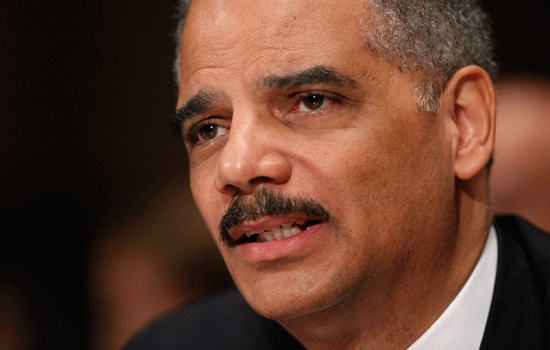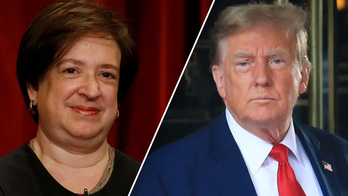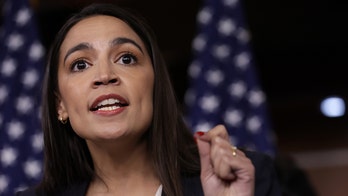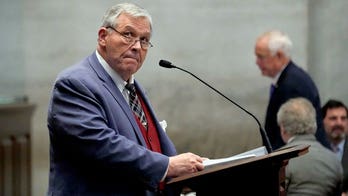
Attorney General Eric Holder testifies on Capitol Hill in Washington, Wednesday, April 14, 2010, before a Senate Judiciary Committee hearing on oversight of the Justice Department. (AP)
The Obama administration doesn't know yet where it's going to try Sept. 11 mastermind Khalid Sheikh Mohammed and his co-conspirators, Attorney General Eric Holder said Wednesday, adding that New York is "not off the table."
"No final decision has been made about the forum which Khalid Sheikh Mohammed and his co-defendants will be tried. As I said at the outset, this is a very close call," Holder told the Senate Judiciary Committee.
"New York is not off the table for where they would be tried, but we have to take into considerations that have been raised by local officials" and community groups," he said.
The administration said a month ago that it would decide within weeks about a location. Holder repeated that time frame on Wednesday.
The decision to hold a trial in New York City drew strong opposition when it was proposed late last year, with Mayor Michael Bloomberg saying the cost for security and the imposition on New York residents, particularly those who live near the courthouse, is too severe.
On Wednesday, Sen. Charles Schumer, D-N.Y., said he agrees that it would be "difficult" to hold a trial in a "densely populated area" like Manhattan.
"You haven't ruled it out. I hope you will," he said.
Holder responded that the Southern District of New York is a much larger place than Manhattan, and other venues beyond New York are still in the consideration. He added that the administration "will use every tool available to it to fight terrorists, every tool. This includes civilian courts and military commissions."
"In making this decision I can assure you this administration has only one paramount goal -- to ensure that justice is done in this case," he said.
Holder, who's been the target of criticism over the administration's indecision on civilian trials for terrorist detainees and the closing of Guantanamo Bay facility where they are held, was participating in a hearing billed as sure to launch fireworks.
Sen. Jeff Sessions, R-Ala., the ranking member on the panel, offered some when he said Holder had shaken Sessions' confidence in him since July's decision to give Mohammad and the others a civilian trial.
"And since that time not one military tribunal has been held. They have been stopped," Sessions said, adding that his own Justice Department conceded last month that military commissions can do a better job of protecting classified information than civilian courts.
"Civilian trials for terrorist combatants are not required by law, policy, history, treaty, or plain justice. Yet this policy, it appears, still remains in effect, or at least unsettled," Sessions said.
"The course you've chosen on national security is steering us into a head-on collision with reality. ... Reality is a stubborn thing. Pretending that terrorists can safely be treated as common criminals will not make it so," he added.
Sen. Dianne Feinstein, D-Calif., countered that she was bothered by questioning of the administration's decision-making process, and told Holder not to be swayed by the criticism.
Feinstein said the Bush administration, which tried 200 terror suspects in Article III, or civilian, courts, was never challenged on its decisions where to hold its trials.
The administration should have "maximum flexibility as to which venues these defendants should be tried," she said, adding that she has "come to the conclusion" the purpose of the attacks is to diminish Holder.
"You remain strong and make the decisions based on the legal facts and where we best get a conviction," she told the attorney general.
On a separate but related matter, the attorney general acknowledged the difficulty in closing the Guantanamo Bay facility, where the remaining 200-plus detainees are being held.
Noting that Republican Sen. John McCain and former President George W. Bush supported closing Guantanamo, Holder said the administration still plans on closing Guantanamo Bay but couldn't offer a timeframe. He said it will be done as "quickly as" and "soon as" it can.
While Republicans have not changed their mind on whether to close the military prison on Cuba -- support is minimal, with Sen. Lindsey Graham, R-S.C., falling into that camp -- Holder suggested support was falling for closing the prison.
"It is still the intention of this administration to close the facility at Guantanamo. There was and I think still is -- maybe not to the degree that once existed -- bipartisan support for the notion that the Guantanamo facility should be closed. It serves as a recruiting toll for those have sworn to harm this nation," he said.
But Holder acknowledged that moving the prisoners elsewhere, for instance to Thompson prison in Thompson, Ill., "will require congressional support for the funding request we've made."
Asked whether some prisoners brought to U.S. soil would have any more rights, Holder suggested the answer is unclear.
"It's not clear how the courts would rule," Holder said.
Graham suggested that Congress could help pass legislation offering guidance on that and indefinite detentions.
Holder replied it "could be helpful" if Congress offered some guidance but said there are still bigger issues involved.
On a separate matter, Holder said it's "highly unlikely" Al Qaeda leader Usama bin Laden "will be taken alive" because he's given instructions to his followers to kill him if he's about to be captured.
"Our plan is to capture him or to kill him. Our hope would be to capture him and to interrogate him and to get useful intelligence from him about Al Qaeda's structure and about Al Qaeda's plans," he said.
Holder said bin Laden would not need to be read his rights if captured alive.
"I cannot foresee any reason" for that," Holder said. "We have sufficient information, statements from bin Laden, so no reason to Mirandize him" if the U.S. wanted to prosecute him in civilian court.




